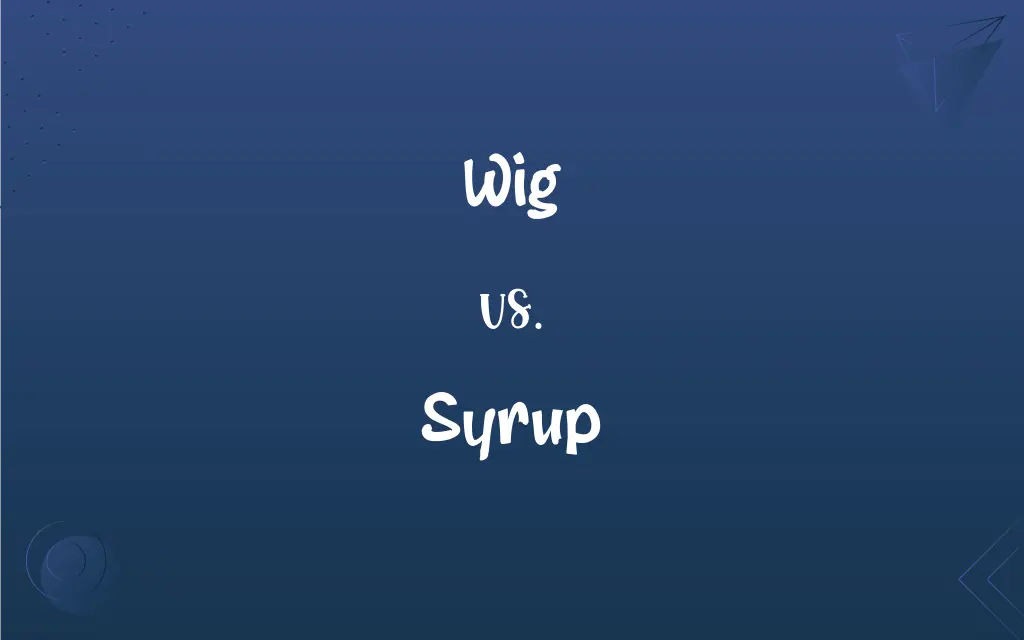Wig vs. Syrup: What's the Difference?
Edited by Harlon Moss || By Janet White || Updated on October 6, 2023
A wig is a head covering made from human hair, animal hair, or synthetic fiber; syrup is a dense, sweet liquid made by dissolving sugar in water, often flavored and used as a sweetener.

Key Differences
A wig is essentially a hairpiece made from real or synthetic hair, and it is designed to cover the head, serving as a fashion accessory or a solution for medical conditions leading to hair loss. Syrup, by contrast, is a food item, a thick and sweet liquid used to flavor, sweeten, or preserve food and drinks. These two are vastly different, with wigs operating in the realm of apparel and personal appearance, and syrup being a culinary item used to enhance taste.
The production of a wig requires a meticulous process of attaching hair to a cap in a way that it resembles natural hair growth. It can be made from various materials including human hair, animal hair, or synthetic fibers, and it can be styled, colored, and cut according to preference. On the other hand, syrup is produced by dissolving a substantial amount of sugar in water and boiling it down to a concentrated, viscous liquid. It can be flavored with various ingredients like vanilla, maple, or fruits, serving diverse culinary needs.
While a wig acts as a substitute for natural hair and alters appearance, providing confidence and style to the wearer, syrup is consumed, adding sweetness and flavor to a variety of dishes, including pancakes, waffles, and desserts. The functions of a wig and syrup are disparate, one being a non-consumable item contributing to personal aesthetics, and the other being an edible condiment enhancing gastronomical experiences.
Wigs and syrup, although incomparable in function and essence, find their significance in diverse fields. Wigs have an extensive history, tracing back to ancient civilizations, and continue to be relevant in fashion, theatre, and medicine. Syrup, with its varying flavors and sweetness levels, is a kitchen staple, indispensable in baking, cooking, and beverage-making, attesting to its culinary importance.
Comparison Chart
Nature
Non-consumable item
Consumable food item
ADVERTISEMENT
Purpose
To cover the head and imitate hair
To sweeten and flavor foods and beverages
Material
Made from human hair, animal hair, or synthetic fibers
Made by dissolving sugar in water and adding flavors
Use
Used for aesthetic, theatrical, or medical reasons
Used as a condiment in cooking and baking
Production
Involves attaching hair to a cap
Involves boiling sugar in water
Wig and Syrup Definitions
Wig
A head covering made from real or synthetic hair.
The actress wore a wig to portray different characters in the play.
ADVERTISEMENT
Syrup
A liquid used for preserving fruits.
The peaches were preserved in a light syrup.
Wig
An item used in costumes or disguises.
The spy used a wig to alter his appearance.
Syrup
A thick, sweet liquid made by dissolving sugar in water.
She drizzled syrup over her pancakes.
Wig
A customizable hairpiece that can be styled, colored, and cut.
She opted for a short, curly wig for a fresh look.
Syrup
A culinary sweetener and flavor enhancer.
The chef added maple syrup to enhance the dish’s sweetness.
Wig
A hair replacement solution for individuals experiencing hair loss.
After chemotherapy, he chose a wig that resembled his natural hair.
Syrup
A medicinal preparation where ingredients are dissolved in a concentrated sugar solution.
The cough syrup relieved his persistent cough.
Wig
An artificial covering of natural or synthetic hair worn on the head for personal adornment, as part of a costume, or to conceal baldness.
Syrup
A thick, sweet, sticky liquid, consisting of a sugar base, natural or artificial flavorings, and water.
Wig
To scold or censure.
Syrup
A thick, sugary liquid made by boiling down or otherwise concentrating plant sap, juice, or grain extracts.
Wig
A head of real or synthetic hair worn on the head to disguise baldness, for cultural or religious reasons, for fashion, or by actors to help them better resemble the character they are portraying.
Syrup
A concentrated solution of sugar in water, often used as a vehicle for medicine.
Wig
A bigwig
Syrup
Any thick liquid that has a high sugar content and which is added to or poured over food as a flavouring.
Maple syrup
Pancake syrup
Peaches in syrup
Wig
An old seal.
Syrup
(by extension) Any viscous liquid.
Cough syrup
Wig
To put on a wig; to provide with a wig (especially of an actor etc.).
Syrup
A wig.
Wig
To upbraid, reprimand.
Syrup
(transitive) To convert or process into syrup.
Wig
To act in an extremely emotional way; to be overly excited, irritable, nervous, or fearful; behave erratically.
That guy must be high. Look how he's wigging.
Syrup
(transitive) To add syrup to.
Wig
To shoot in the head.
Syrup
(transitive) To sabotage (a vehicle) by pouring syrup into the gas tank.
Wig
A covering for the head, consisting of hair interwoven or united by a kind of network, either in imitation of the natural growth, or in abundant and flowing curls, worn to supply a deficiency of natural hair, or for ornament, or according to traditional usage, as a part of an official or professional dress, the latter especially in England by judges and barristers.
Syrup
Same as Sirup, Sirupy.
Wig
An old seal; - so called by fishermen.
Syrup
A thick sweet sticky liquid
Wig
To censure or rebuke; to hold up to reprobation; to scold.
Syrup
A beverage ingredient used to add sweetness and flavor.
He mixed raspberry syrup into the cocktail for a fruity note.
Wig
Hairpiece covering the head and made of real or synthetic hair
Wig
British slang for a scolding
Wig
A hair accessory used for cosmetic or aesthetic purposes.
She styled her wig to match her evening gown.
FAQs
Can syrup be used as a preservative?
Yes, syrup can preserve foods due to its high sugar content.
Are wigs worn only for fashion?
No, wigs are also worn for theatrical performances, medical conditions, and disguises.
Can wigs be made from synthetic materials?
Yes, wigs can be made from synthetic fibers, human hair, or animal hair.
Is syrup only used in culinary applications?
Predominantly yes, but syrup can also be used medicinally to dissolve medicinal ingredients.
Is syrup the same as honey?
No, syrup is made by dissolving sugar in water, while honey is a natural product made by bees.
What is a wig primarily used for?
A wig is primarily used for covering the head and simulating natural hair.
Is syrup always sweet?
Yes, syrup is characteristically sweet, made by dissolving sugar in water.
Are wigs detectable?
Quality wigs are designed to look natural, but some may be detectable up close or to the touch.
Do wigs need special care?
Yes, wigs require careful handling and specific maintenance to preserve their appearance.
Can a wig be permanently attached?
Some wigs can be secured with adhesive for longer wear, but they are typically removable.
Does syrup expire?
Syrup can eventually spoil, but it has a long shelf life due to its high sugar content.
Can wigs be styled like natural hair?
Yes, especially human hair wigs, can be styled similarly to natural hair, with limitations based on the construction of the wig.
Can syrup be made from fruits?
Yes, fruit syrup is made by reducing fruit juice with sugar.
Is syrup calorie-dense?
Yes, syrup is calorie-dense due to its high sugar content.
Can men wear wigs?
Absolutely, many men wear wigs for various reasons, including hair loss and theatrical purposes.
About Author
Written by
Janet WhiteJanet White has been an esteemed writer and blogger for Difference Wiki. Holding a Master's degree in Science and Medical Journalism from the prestigious Boston University, she has consistently demonstrated her expertise and passion for her field. When she's not immersed in her work, Janet relishes her time exercising, delving into a good book, and cherishing moments with friends and family.
Edited by
Harlon MossHarlon is a seasoned quality moderator and accomplished content writer for Difference Wiki. An alumnus of the prestigious University of California, he earned his degree in Computer Science. Leveraging his academic background, Harlon brings a meticulous and informed perspective to his work, ensuring content accuracy and excellence.































































